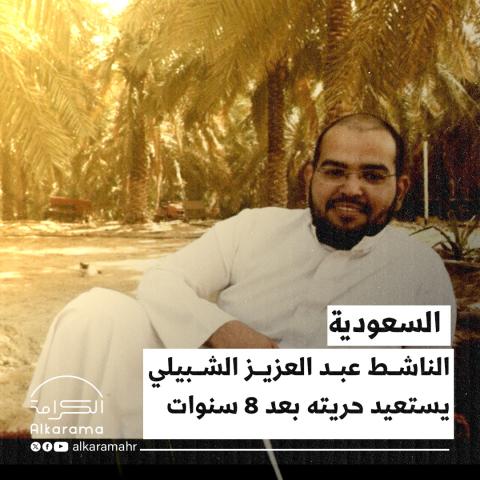
Alkarama has learned from Saudi human rights sources that the authorities have finally released Abdulaziz Al-Shubaily, a human rights activist and member of the Saudi Association for Civil and Political Rights (ACPRA), after nearly eight years of detention.
Alkarama had closely followed Al-Shubaily’s case and, on 30 April 2015, submitted an urgent appeal to the United Nations Working Group on Arbitrary Detention (WGAD) and to the Special Rapporteur on the situation of human rights defenders regarding his trial before the Specialized Criminal Court.
Abdulaziz Al-Shubaily is a member of ACPRA, an association founded in 2009 but never officially recognized by the Saudi authorities. Despite lacking legal status, ACPRA—known by its acronym—worked to document human rights violations in Saudi Arabia and to transmit this information to the United Nations. It also called for the Ministry of Interior to be held accountable for its violations of fundamental rights.
In 2012, the Saudi authorities launched a broad crackdown on ACPRA members and human rights defenders, initiating judicial proceedings that resulted in harsh prison sentences and the dissolution of the association.
Background
Al-Shubaily was summoned multiple times for interrogation and appeared before the Specialized Criminal Court on 7 May 2015, a judicial body frequently criticized by UN experts and mechanisms for its lack of independence and failure to uphold fair trial guarantees. During this hearing, he refused to recognize the legitimacy of the court, arguing that it should only have jurisdiction over terrorism-related cases.
His trial began on 27 October 2014, as part of the broader repression against ACPRA and its members, based on the 2014 Law on Combating Terrorism and its Financing. This law is widely criticized for its vague and overly broad definitions of terrorism, which are used to criminalize legitimate acts such as freedom of expression, peaceful dissent, and human rights advocacy.
Al-Shubaily was eventually arrested on 17 September 2017 in the Al-Qassim region. He was later sentenced by the Specialized Criminal Court to eight years in prison, followed by an eight-year travel ban, on charges including incitement of public opinion, contempt of the judiciary, and participation in the founding of ACPRA.
Alkarama’s Activism
Alkarama has consistently followed the cases of detained ACPRA members, submitting several complaints to the UN special procedures on human rights. It has regularly drawn attention to their situation through parallel reports to UN mechanisms and produced a range of media content to advocate for their cause, denounce the violations they face, and put pressure on the Saudi government to end its repressive policies and guarantee freedom of expression.
In October 2016, Alkarama, in cooperation with other NGOs, launched a campaign against the arbitrary detention and persecution of ACPRA members. As part of this effort, an open letter was addressed to the United Nations High Commissioner for Human Rights, urging him to demand the immediate release of all detained members and to call for legislative reforms to safeguard the fundamental rights of all Saudi citizens.
In March 2018, on the occasion of Crown Prince Mohammed bin Salman’s first official visits to several foreign capitals, Alkarama and other international human rights organizations issued a joint appeal to the international community. They used the opportunity to highlight the plight of detained activists and to draw the attention of host countries to the repressive practices and systematic violations faced by human rights defenders in Saudi Arabia.
In addition to Al-Shubaily, Alkarama has consistently advocated for the release of other ACPRA members. While some have been freed, others have tragically died in detention, such as Dr. Abdullah Al-Hamid. Several remain behind bars, including activist Mohamed Al-Bajadi, despite having served their sentences.
Alkarama hopes that the release of Mr. Al-Shubaily will mark a first step toward the liberation of all prisoners of conscience in Saudi Arabia, the release of all individuals detained for peacefully exercising their freedom of expression or expressing political dissent, and an end to repressive policies, intimidation, and the abusive use of anti-terrorism laws to silence critical voices.
